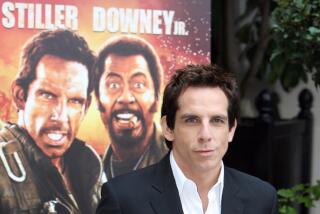An exclamation point is apropos
- Share via
BRIGHTON, England — Lynne Truss fears the English language could be in its death throes.
Proper, written English, that is -- the kind with correctly placed apostrophes, elegantly positioned semicolons, commas in all the right places and in none of the wrong ones. It’s being shoved aside, she thinks, by an electronic onslaught of uncapitalized, unpunctuated, ill-thought-out Internet verbiage.
Truss, a longtime writer and editor, is sure that trying to halt the decline would be hopeless, but she wants her new book, “Eats, Shoots & Leaves,” to at least serve as a warm and funny eulogy to a little-heralded but crucial piece of the language: punctuation.
Despite tackling a subject that’s so dry that it’s put generations of schoolchildren to sleep, the book has won critics’ praise for its humor and readability and has been a surprise hit in Britain, selling more than half a million copies. Truss also received the book of the year prize at the recent British Book Awards ceremonies -- an honor bestowed by a panel of 400 publishers, wholesalers and booksellers, and the public.
“Eats, Shoots & Leaves,” whose title comes from a corny punctuation joke about a panda in a bar, is a lighthearted, affectionate tribute to the system of jots, dots and dashes that make written language intelligible.
“Sticklers unite,” Truss urges in the book’s introduction. “You have nothing to lose but your sense of proportion, and arguably you didn’t have a lot of that to begin with.”
Relaxing in a sleek hotel lobby in her hometown of Brighton, on England’s south coast, Truss, 48, seems to relish the part of linguistic nitpicker. She has bobbed blond hair and a warm smile, and displays a sharp, self-deprecating wit.
She insists she’s more surprised than anyone by the book’s success.
Truss -- so modest she apologizes (needlessly) for being a poor interview subject -- says she was well into writing last year before she felt sure the topic was substantial enough for a book.
She eventually concluded proper usage of punctuation was coming to a cataclysmic end, making this exactly the right time to honor it.
“It’s just a wonderful moment to appreciate it before it goes, like going to see Venice before it sinks,” she said.
“I sort of feel, well, what a great system and how beautiful and elegant it is, and to have it just dropped and cast aside when there’s nothing being offered in its place just seems quite barbaric.”
She blames the decline on the failure of schools to teach the basic rules, and on the explosion of communication technologies that have allowed punctuation ignoramuses everywhere to deluge others with their poorly organized thoughts.
“People who don’t know their apostrophe from their elbow are positively invited to disseminate their writings to anyone on the planet stupid enough to double-click and scroll,” she writes.
In the always hurrying modern world, Truss says, few slow down enough to take care over details that used to be the sign of a thoughtful writer.
She sees evidence for punctuation’s demise everywhere. Her book is filled with examples -- some funny, some just plain atrocious -- of punctuation abused, ignored and misplaced.
“I saw a sign for ‘Book’s’ with an apostrophe in it and something deep inside me snapped,” she writes. “Despair was the initial impetus for this book.”
She’s willing to forgive the greengrocers who advertise “apple’s” and “orange’s” but saves particular venom for those publishing on a grander scale and those who should know better.
Truss lambastes Britain’s National Union of Teachers for a letter in which it refers to “childrens’ education,” the British Broadcasting Corp. for promising “nouns and apostrophe’s” in a grammar lesson on its website and the government for a passport application form that asked for the full name of “the person who’s details are given in Section 02.” All three apostrophes are misused.
She’s also furious about the apostrophe Warner Bros. omitted from the title of the Sandra Bullock-Hugh Grant comedy “Two Weeks Notice” (make that “Two Weeks’ Notice,” insists Truss), saying anyone who spends big money on a promotional campaign can afford a proofreader.
Some examples amuse rather than exasperate.
Truss takes a road sign that warns “Children Drive Slowly” as a declarative sentence describing young drivers’ lack of speed, and notes that the sign “No Dogs Please” is flat-out wrong.
“Many dogs do please, as a matter of fact; they rather make a point of it,” she writes.
Truss’ book has clearly hit a nerve among readers fretful over what she sees as a wider decline in literacy. The book, released in the United States on Tuesday, has been at the top of British bestseller lists since December and has sold a massive 580,000 copies here.
Truss spent most of her career as an editor and journalist, writing three comic novels on the side that sold poorly. She expected “Eats, Shoots & Leaves” to be a modest seller, too, and says she’s been stunned by the way it’s caught on.
Still, she says, there’s little chance it will make a difference.
“The forces toward barbaric illiteracy, I dare say, are much too strong ... for a few people,” she says, sighing. “I don’t think we’re going to stop the rot.”
More to Read
Sign up for our Book Club newsletter
Get the latest news, events and more from the Los Angeles Times Book Club, and help us get L.A. reading and talking.
You may occasionally receive promotional content from the Los Angeles Times.








